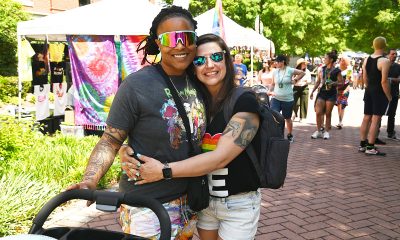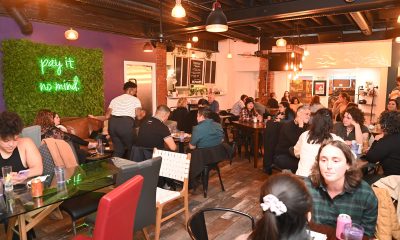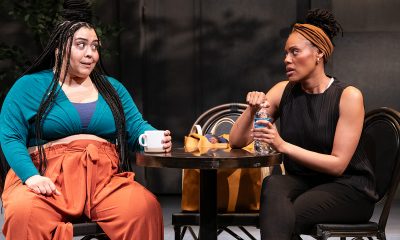District of Columbia
D.C. LGBTQ Budget Coalition urges city to boost funding for queer programs
Most requests not included in mayor’s proposed 2024 budget
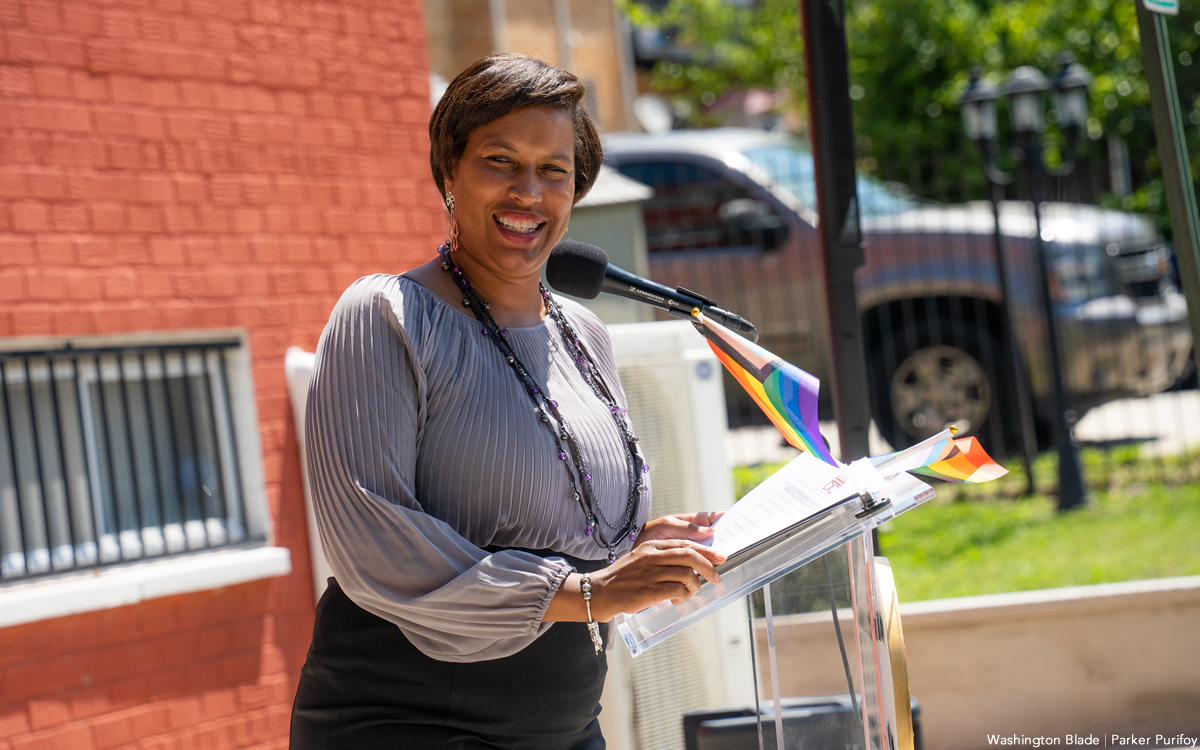
The D.C. LGBTQ Budget Coalition, which consists of at least 10 prominent local LGBTQ organizations and another nine LGBTQ supportive allied groups, is calling on Mayor Muriel Bowser and the D.C. Council to include about a dozen specific programs in the city’s fiscal year 2024 budget that add up to about $13.5 million in funding.
According to information provided to the Washington Blade by one of the coalition officials, which the official said was subject to change, the mayor’s proposed budget does not include the requested funding for at least 10 of the coalition’s 12 specific requests coming to a total of about $13 million.
Coalition coordinator Heidi Ellis said that among the coalition’s proposals not included in the mayor’s budget is a request for $10.5 million to fund two harm reduction and services centers to address the opioid and fentanyl drug overdose crisis impacting communities, including the LGBTQ community, across the city.
The mayor’s budget calls for $9.5 million to fund a single “stabilization & sobering center” to address the overdose crisis. But Ellis said the coalition does not consider that proposal an acceptable alternative to the coalition’s proposal for two harm reduction centers.
With the mayor’s $9.5 million “stabilization and sobering center” proposal not included as part of the coalition’s budget requests, that means the coalition believes the mayor’s budget only includes about $500,000 out of the coalition’s $13.5 million overall request.
Ellis said that in addition to not including much of the funding the coalition is asking for, the mayor’s budget includes some cuts in funding for LGBTQ-related programs that were included in the existing 2023 budget and previous year budgets. Among the cuts, Ellis said, are for a workforce program that assists transgender and gender nonconforming residents in finding gainful employment and for programs assisting LGBTQ people experiencing intimate partner violence.
One of the the coalition’s proposals that Bowser’s proposed budget does include is a request to continue to allocate at least $500,000 in funds for the Mayor’s Office of LGBTQ Affairs for LGBTQ community development grants.
“We share detailed budget requests that provide crucial services to the LGBTQ+ community of Washington, D.C.,” the coalition states in a nine-page letter sent to the mayor and each of the 13 members of the D.C. Council in February that outlines its specific funding proposals.
“We are a mission-driven group working to advocate for dedicated funding to support LGBTQ+ residents with a focus on trans people of color and low-income residents,” the letter says. “The Coalition has worked tirelessly for several months with the Mayor’s office, the Council, various D.C. agencies, and most importantly, the community to identify these needs,” according to the letter.
“Our recommendations reflect that work in addition to our extensive research around these issues and the broader District landscape,” it says. “We ask that the Mayor and the Council adopt our recommendations as they specifically address some of the chronic and immediate issues facing the District.”
At the time she submitted her proposed $19.7 billion F.Y. 2024 budget to the Council last month, the mayor said the city faces a projected drop in revenue of more than $390 million due, among other things, to reduced tax revenue from commercial real estate along with the end of pandemic-era federal aid to D.C. and other cities.
The projected reduction in revenue will force her and the Council to make difficult decisions on funding reductions, including at least $373 million in proposed reductions in her budget, the mayor said. Among the reductions is the proposed elimination of 749 vacant D.C. government positions.
In response to a request by the Blade for comment on the coalition’s claim that the mayor’s budget does not include most of the requests by the LGBTQ Budget Coalition, Japer Bowles, director of the Mayor’s Office of LGBTQ Affairs, provided a written statement.
“We appreciate the community and advocacy groups identifying areas of improvement and putting forward their requests,” Bowles told the Blade in his statement. “We are proud to continue all formerly funded LGBTQIA+ programs, albeit at new levels, and our agencies are dedicated to continuing to work with our many LGBTQIA+ community-based organizations and our innovative programs to add resilience and capacity in the long term,” he said.
His statement did not specifically address the coalition’s claims that most of their requests were not included in the mayor’s budget other than to say, “our budget is still feeling the impacts of the pandemic,” a reference to Mayor Bowser’s assertion that the city faces a revenue shortfall and budget cuts would be needed in the fiscal year 2024 budget.
Bowles added that the Office of LGBTQ Affairs “will be providing more training funding for LGBTQIA+ cultural competency,” as requested by the coalition. He said the mayor’s office would also be sending the D.C. Council a letter identifying “corrections and amendments” to the proposed budget, but those changes will not bring about “significant adjustments to agencies budgets related to the [coalition’s] request at this time.”
Before his appointment by Bowser to become director of the LGBTQ Affairs Office, Bowles served as coordinator of the LGBTQ Budget Coalition after playing a role in creating the coalition as an elected Advisory Neighborhood Commissioner.
Among the LGBTQ and LGBTQ supportive organizations that are members of the D.C. LGBTQ Budget Coalition are Capital Pride Alliance, the D.C. Center for the LGBT Community, Capital Stonewall Democrats, the Wanda Alston Foundation, the LGBTQ youth advocacy group SMYAL, the sex worker advocacy group HIPS, the Washington AIDS Partnership, Us Helping Us, the Gay and Lesbian Activists Alliance (GLAA), the ANC Rainbow Caucus, Damien Ministries, and the Latin American Youth Center.
In its nine-page letter to the mayor and the Council, the coalition included these funding requests for the 2024 budget:
• An LGBTQ+ reentry ‘Housing for All’ Pilot Program at the city’s Office of Victim Services and Justice Grants for citizens returning from incarceration — $750,000.
• Additional housing vouchers for LGBTQ+ residents for the Mayor’s Office of LGBTQ Affairs to help support those who are homeless or at risk of homelessness — $500,000.
• Harm Reduction Services & Centers — $10.5 million. To address the “alarming” and growing number of fentanyl and opioid related drug overdose deaths in the city, this calls for funding two Harm Reduction Centers on each side of the Anacostia River that will be open 24 hours each day to “aid in eliminating the stigma around substance usage, to avoid the burden on our criminal justice system, and to, most importantly, save lives.”
• Employment & Workforce Development Programs for the Department of Human Services — $500,000. A request for an “enhancement for the Transgender & Gender-nonconforming workforce program to ensure a long-term approach to closing the employment and wage gap for T/TNC residents in the District.”
• Employment Coordinator/Employment Case Management Advocate for the Office of LGBTQ Affairs — $75,000. This position would “help LGBTQ+ residents navigate these workforce programs by serving as point of contact for community members seeking employment and those trying to access the aforementioned workforce programs.”
• Health Initiatives — no specific funding request. A call for the city’s HIV/AIDS, Hepatitis, STI, and TB Administration (HAHSTA) to take steps to reverse a trend brought about by COVID in which the number of people seeking HIV testing across the city fell by 20 percent. The city should also address “the disparity of testing in marginalized communities, specifically Black and brown women, TGNC, etc.” communities.
• Safety & Inclusive Emergency Services — $860,000. Out of this total, $60,000 for the Mayor’s Office of LGBTQ Affairs to improve and expand its cultural competency training for D.C. police and D.C. Fire and Emergency Medical Services Department first responders; a total of $600,000 for the Office of Victim Services and Justice Grants to expand its services and outreach to the LGBTQ+ community for intimate partner violence, sexual assault, and hate crimes; and $200,000 to establish a Violence Prevention and Response Team (VPART) coordinator at the Office of LGBTQ Affairs to focus on anti-LGBTQ hate crimes.
• Improving Language Access & Immigration Services — $250,000 for the Department of Human Services and $100,000 for Office of LGBTQ Affairs. An increase in migrants sent to D.C. from other states, including LGBTQ+ immigrants, has created a need for more language interpretation services for those who are Limited English Proficient (LEP) or Non-English Proficient (NEP)
• Supporting the Newly Established DC LGBTQ+ Community Center — $200,000. The mayor’s office has already awarded a $1 million grant to help pay for the renovation of the section of a new building the LGBT Center will be moving into later this year. Those funds have been “exhausted,” the coalition says, for the building renovation. “The DC Center and Capital Pride Alliance, in partnership with the Coalition, are requesting $200,000 in recurring dollars to support the operating costs associated with the Center.”
In a separate letter to the D.C. Council, GLAA expressed concern that the mayor’s proposed budget calls for eliminating at least six staff positions at the D.C. Office of Human Rights (OHR). The OHR, among other things, enforces the D.C. Human Rights Act, which bans discrimination against LGBTQ people.
The GLAA letter, signed by GLAA President Tyrone Hanley, calls for the budget to fund one additional OHR staff person to support the enforcement of a city law protecting tenants from unfair evictions, another new OHR staff person to address OHR’s “outdated case management system,” and one or more additional staff to help enforce the D.C. Domestic Workers Act, which supports the rights of domestic workers.
Several D.C. Council committees that oversee various D.C. government agencies were scheduled to make final recommendations to the full Council this week in a process known as a “markup” for the budget. The Council is expected to vote on its final version of the D.C. budget in May.
Full details of the coalition’s budget requests and the names of the organizations that make up the coalition can be viewed at the DC LGBTQ+ Budget Coalition website.
District of Columbia
As You Are bar closes temporarily, citing problems with building
Shutdown comes two months after fundraising appeal brought in $170,000
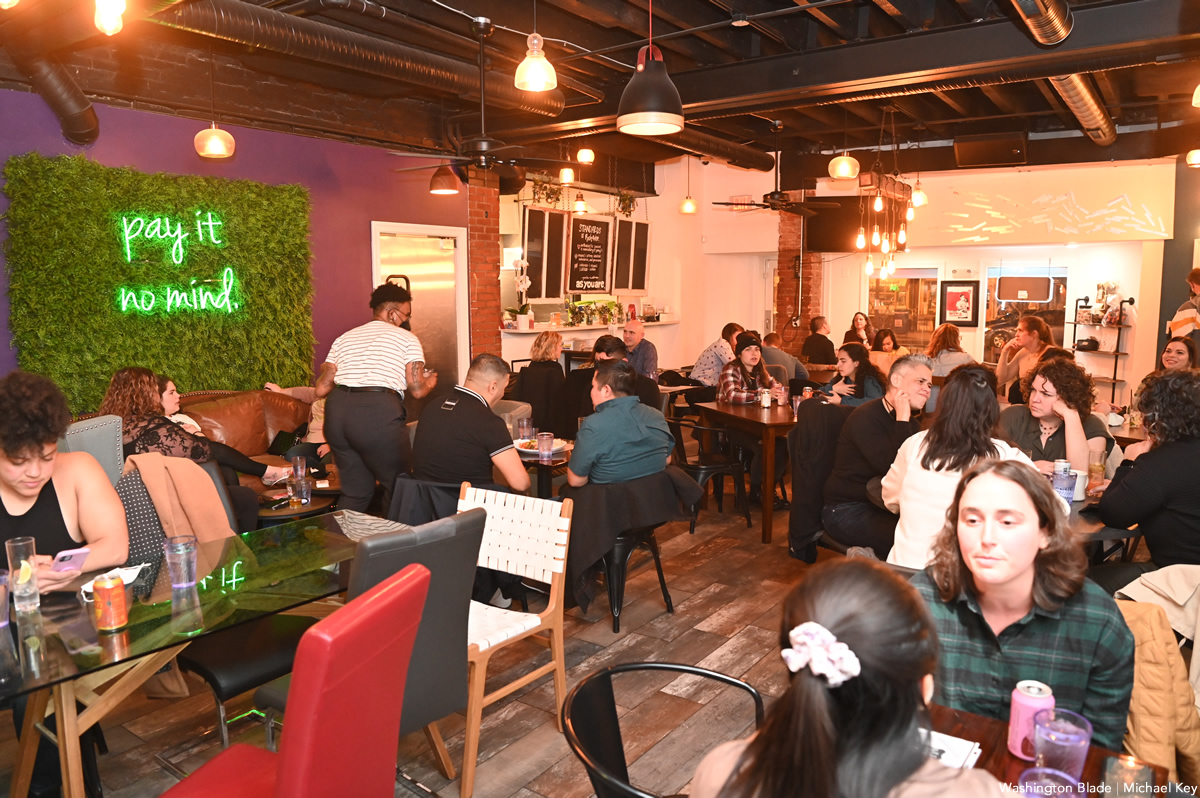
As You Are, the LGBTQ café and bar located in the Barracks Row section of Capitol Hill near the Eastern Market Metro station, has announced on its Instagram page that problems associated with its building at 500 8th St., S.E., forced it to “temporarily” close on April 8.
“As you may be aware, As You Are’s location in Eastern Market has been closed since April 8, when we began to have concerns about the physical condition of the building,” the Instagram message states. “We worked quickly to alert our landlord, and they have assessed the building with their engineers,” the message says.
“We understand that certain repairs need to be made to ensure the safety of our staff, patrons, and community,” the message concludes.
In one of two more recent videos posted on Instagram on April 17 and 26, As You Are co-owners Jo McDaniel and Rachel Pike said they did not have any update on when they can reopen. “The engineers and contractors have all come into the space, and we’re just waiting on a plan and a timeline from our landlord,” McDaniel said in the video.
Pike mentioned in one of the videos that As You Are has a Venmo app set up, and said they appreciate the support they have been receiving from the community. McDaniel added, “We’re really interested in supporting our team through this, as this is an unexpected loss of income for all of us.”
McDaniel didn’t immediately respond to a request from the Washington Blade for a further update on where things stand with the building repair project and the specific nature of the problems with the building. An earlier message posted on the As You Are website said, “Heavy rain damaged the back wall of our building, and we are closed to assess and repair.”
The message added, “Regular updates and ways to support can be found on our Instagram page @asyouaredc.”
The April 8 shutdown came a little over two months after As You Are issued a GoFundMe appeal on Feb. 5 seeking emergency financial support to prevent it from closing in February due to a $150,000 debt. In a display of strong community support, its $150,000 fundraising goal was reached in less than a week. By the following week, the GoFundMe appeal had pulled in more than $170,000 from more than 3,000 individual donations.
Many of the donors left messages on the GoFundMe page for As You Are expressing their strong support for the bar and café, saying it served as a uniquely supportive space for all members of the LGBTQ community.
In the GoFundMe message, McDaniel and Pike said their goal in opening their business in March 2022 was to offer community center type programming beyond just a bar and café.
“AYA is a café, bar and dance floor that hosts diverse programming nearly every night of the week, including social sport leagues, Queer youth socials, weekly karaoke, book clubs, open mics, Queer author events, dance parties, and much more,” the two said in their message.
The building’s owner and the As You Are landlord, Rueben Bajaj, who is the principal operator of the Bethesda, Md., based real estate firm White Star Investments, couldn’t immediately be reached for comment. The Washington Post reported that he contributed $500 to the As You Are GoFundMe appeal, saying, “I personally want to see As You Are succeed.”
District of Columbia
Weekend brings two shootings in U Street, Dupont Circle areas
Man dies after incident at Desperados

A man was shot to death shortly after 1 a.m. on Saturday, April 27, inside the Desperados Burgers & Bar at 1342 U St., N.W., which is located on the same block a short distance away from the LGBTQ nightclub Bunker D.C. and around the corner less than a block away from the recently opened LGBTQ bar Crush on 14th Street, N.W.
The incident prompted Bunker to post on its Facebook page a message saying its security team quickly ushered patrons standing outside to enter the club and as a precautionary measure prevented patrons from leaving until it was deemed safe to do so.
A D.C. police statement identifies the shooting victim as Kenneth Goins, 43, of Salisbury, Md. The statement says officers on patrol in the 1300 block of U Street, N.W. heard gunshots at about 1:12 a.m. and immediately arrived at Desperados to investigate the incident.
“Officers located a man inside with multiple gunshot wounds,” the statement says. “Despite all life saving efforts, the victim was pronounced dead on the scene,” it says. Neither the statement nor a police incident report pertaining to the shooting provides a description of the person who committed the shooting nor discloses whether any of the customers inside the restaurant and bar witnessed the shooting.
The statement says the police Homicide Branch is investigating the shooting and urges anyone with knowledge of the incident to call police at 202-272-9099. Like all homicide cases, it says the D.C. Metropolitan Police Department offers a reward of up to $25,000 to anyone who provides information that leads to the arrest and conviction of the person or persons responsible for a homicide committed in the District.
“There was a shooting incident on U ST. N.W., just 4 doors down from BUNKER,” the Bunker Facebook post says. “Our security team promptly responded, ensuring the safety of everyone by ushering them inside for cover,” it says. “Currently, the courageous police officers are outside, handling the situation and working diligently to maintain a secure environment for our guests,” the message continues.
“As a responsible establishment, we strongly prioritize your safety, and as a precautionary measure, we will not permit anyone to exit the building until we deem it safe to do so,” the posting says. “Rest assured, we, as the owners, take this matter very seriously, and your safety remains our highest priority.”
The U Street shooting at Desperados Burgers & Bar took place a little over two hours after six people were shot and wounded outside the Decades nightclub at 1219 Connecticut Ave., N.W. near Dupont Circle and near several gay bars on P Street and 17th Street in the Dupont Circle area. Police said none of those who were shot suffered life-threatening injuries
A separate police statement says with the help of several witnesses, police identified and arrested Rennwel Mantock, 29, of Hyattsville, Md., in connection with the shooting on charges of Assault with Intent to Kill, Possession of Unregistered Ammunition, and Possession of an Unregistered Firearm. The statement says a gun belonging to Mantock was recovered on the scene. Court records show a judge has ordered him to be held without bond until a May 7 preliminary hearing.
“The detectives’ investigation determined Mantock opened fire after employees removed him from a nightclub following a dispute,” according to the statement.
A police arrest affidavit filed in D.C. Superior Court says Mantock told police at the time he was apprehended on the scene that he was dancing with a woman at the club when a security guard ordered him to leave and then “grabbed him by the neck and punched him in the face right before dragging him down the steps.” The Decades club states on its website that it has several floors with multiple bars.
According to the arrest affidavit, Mantock told police that one of the security officials punched him in the face again and threw him to the ground after dragging him out the door. It says Mantock “stated that he then pulled out his gun and started shooting” because “he was very upset about the security punching him in the face,” adding that he “began firing at the Decades’ security.”
The affidavit says five of the six people shot were Decades employees.
Gay former Dupont Circle Advisory Neighborhood Commissioner Mike Silverstein, who lives near where the shooting took place, said Decades is not known as a place that LGBTQ people patronize but said the surrounding neighborhood is home to many LGBTQ residents and draws many LGBTQ visitors.
District of Columbia
Catching up with the asexuals and aromantics of D.C.
Exploring identity and finding community

There was enough commotion in the sky at the Blossom Kite Festival that bees might have been pollinating the Washington Monument. I despaired of quickly finding the Asexuals and Aromantics of the Mid-Atlantic—I couldn’t make out a single asexual flag among the kites up above. I thought to myself that if it had been the Homosexuals of the Mid-Atlantic I would’ve had my gaydar to rely on. Was there even such a thing as ace-dar?
As it turned out, the asexual kite the group had meant to fly was a little too pesky to pilot. “Have you ever used a stunt kite?” Bonnie, the event organizer asked me. “I bought one. It looked really cool. But I can’t make it work.” She sighed. “I can’t get the thing six feet off the ground.” The group hardly seemed to care. There was caramel popcorn and cookies, board games and head massages, a game of charades with more than its fair share of Pokémon. The kites up above might as well have been a coincidental sideshow. Nearly two dozen folks filtered in and out of the picnic throughout the course of the day.
But I counted myself lucky that Bonnie picked me out of the crowd. If there’s such a thing as ace-dar, it eludes asexuals too. The online forum for all matters asexual, AVEN, or the Asexual Visibility and Education Network, is filled with laments: “I don’t think it’s possible.” “Dude, I wish I had an ace-dar.” “If it exists, I don’t have it.” “I think this is just like a broken clock is right twice a day type thing.” What seems to be a more common experience is meeting someone you just click with—only to find out later that they’re asexual. A few of the folks I met described how close childhood friends of theirs likewise came out in adulthood, a phenomenon that will be familiar to many queer people. But it is all the more astounding for asexuals to find each other this way, given that asexual people constitute 1.7% of sexual minorities in America, and so merely .1% of the population at large.
To help other asexuals identify you out in the world, some folks wear a black ring on their middle finger, much as an earring on the right ear used to signify homosexuality in a less welcoming era. The only problem? The swinger community—with its definite non-asexuality—has also adopted the signal. “It’s still a thing,” said Emily Karp. “So some people wear their ace rings just to the ace meet-ups.” Karp has been the primary coordinator for the Asexuals and Aromantics of the Mid-Atlantic (AAMA) since 2021, and a member of the meet-up for a decade. She clicked with the group immediately. After showing up for a Fourth of July potluck in the mid-afternoon, she ended up staying past midnight. “We played Cards against Humanity, which was a very, very fun thing to do. It’s funny in a way that’s different than if we were playing with people that weren’t ace. Some of the cards are implying, like, the person would be motivated by sex in a way that’s absurd, because we know they aren’t.”
Where so many social organizations withered during the pandemic, the AAMA flourished. Today, it boasts almost 2,000 members on meetup.com. Karp hypothesized that all the social isolation gave people copious time to reflect on themselves, and that the ease of meeting up online made it convenient as a way for people to explore their sexual identity and find community. Online events continue to make up about a third of the group’s meet-ups. The format allows people to participate who live farther out from D.C. And it allows people to participate at their preferred level of comfort: while many people participate much as they would at an in-person event, some prefer to watch anonymously, video feed off. Others prefer to participate in the chat box, though not in spoken conversation.
A recent online event was organized for a discussion of Rhaina Cohen’s book, “The Other Significant Others,” published in February. Cohen’s book discusses friendship as an alternative model for “significant others,” apart from the romantic model that is presupposed to be both the center and goal of people’s lives. The AAMA group received the book with enthusiasm. “It literally re-wired my brain,” as one person put it. People discussed the importance of friendship to their lives, and their difficulties in a world that de-prioritized friendship. “I can break up with a friend over text, and we don’t owe each other a conversation,” one said. But there was some disagreement when it came to the book’s discussion of romantic relationships. “It relegates ace relationships to the ‘friend’ or ‘platonic’ category, to the normie-reader,” one person wrote in the chat. “Our whole ace point is that we can have equivalent life relationships to allo people, simply without sex.” (“Allo” is shorthand for allosexual or alloromantic, people who do experience sexual or romantic attraction.)
The folks of the AAMA do not share a consensus on the importance of romantic relationships to their lives. Some asexuals identify as aromantic, some don’t. And some aromantics don’t identify as asexual, either. The “Aromantic” in the title of the group is a relatively recent addition. In 2017, the group underwent a number of big changes. The group was marching for the first time in D.C. Pride, participating in the LGBTQ Creating Change conference, and developing a separate advocacy and activism arm. Moreover, the group had become large enough that discussions were opened up into forming separate chapters for D.C., Central Virginia, and Baltimore. During those discussions, the group leadership realized that aromantic people who also identified as allosexual didn’t really have a space to call their own. “We were thinking it would be good to probably change the name of the Meetup group,” Emily said. “But we were not 100% sure. Because [there were] like 1,000 people in the group, and they’re all aces, and it’s like, ‘Do you really want to add a non-ace person?’” The group leadership decided to err on the side of inclusion. “You know, being less gatekeep-y was better. It gave them a place to go — because there was nowhere else to go.”
The DC LGBT Center now sponsors a support group for both asexuals and aromantics, but it was formed just a short while ago, in 2022. The founder of the group originally sought out the center’s bisexual support group, since they didn’t have any resources for ace folks. “The organizer said, you know what, why don’t we just start an ace/aro group? Like, why don’t we just do it?” He laughed. “I was impressed with the turnout, the first call. It’s almost like we tapped into, like, a dam. You poke a hole in the dam, and the water just rushes out.” The group has a great deal of overlap with the AAMA, but it is often a person’s first point of contact with the asexual and aromantic community in D.C., especially since the group focuses on exploring what it means to be asexual. Someone new shows up at almost every meeting. “And I’m so grateful that I did,” one member said. “I kind of showed up and just trauma dumped, and everyone was really supportive.”
Since the ace and aro community is so small, even within the broader queer community, ace and aro folks often go unrecognized. To the chagrin of many, the White House will write up fact sheets about the LGBTQI+ community, which is odd, given that when the “I” is added to the acronym, the “A” is usually added too. OKCupid has 22 genders and 12 orientations on its dating website, but “aromantic” is not one of them — presumably because aromantic people don’t want anything out of dating. And since asexuality and aromanticism are defined by the absence of things, it can seem to others like ace and aro people are ‘missing something.’ One member of the LGBT center support group had an interesting response. “The space is filled by… whatever else!” they said. “We’re not doing a relationship ‘without that thing.’ We’re doing a full scale relationship — as it makes sense to us.”
CJ Higgins is a postdoctoral fellow with the Alexander Grass Humanities Institute at Johns Hopkins University.

